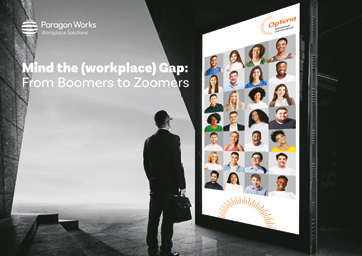 Jo Cameron, Head of Recruitment Process Outsourcing (RPO) at Paragon Works offers some valuable insights into the evolving candidate experience in a new era of work
Jo Cameron, Head of Recruitment Process Outsourcing (RPO) at Paragon Works offers some valuable insights into the evolving candidate experience in a new era of work
In today’s competitive talent landscape, the question candidates are asking businesses is simple: Who are you, and what opportunities do you have for me? For many organisations the shift in power from employer to employee is already underway. Now more than ever, candidates – particularly Gen Z are approaching the job search as a thorough research project, and their expectations are reshaping recruitment, onboarding, and the entire employee experience.
THE EVOLUTION OF JOB SEARCHING
In the past, job seekers scoured newspapers, job boards, or relied on word-of-mouth and recruitment agencies. Applications were transactional: a CV, a cover letter, and a long wait. Today, the process is far more dynamic and digital. Candidates explore roles through LinkedIn, niche job platforms, company career pages, and even social media channels like TikTok and Instagram.
The modern candidate doesn’t just apply, they investigate. Job seekers now conduct multi-layered research before hitting “submit”. They read Glassdoor reviews, stalk a company’s social media, review leadership profiles on LinkedIn, and analyse news articles for any points of interest that align with their values. Gen Z will gravitate toward transparency and authenticity, they want to know not just what a company does, but how it behaves, both internally and externally. Figures from Paragon Workplace Solutions’ workplace report(i) show that 55 per cent of Gen Zs research a company’s environmental impact and policies before accepting a job.
WHAT CANDIDATES WANT BEYOND SALARY AND JOB TITLES
Salary, job title, and benefits still matter—but they are far from the only deciding factors. Today’s candidates are choosing businesses based on deeper alignment with their values and long-term potential for growth. A few priorities now front and centre in candidate decision-making include:
- Diversity, Equity & Inclusion (DEI): Candidates, especially younger generations, want to work for organisations that actively promote equity and inclusion. They’re looking for representation at leadership levels, inclusive policies, and tangible action, more than just performative statements, with 76 per cent of Gen Z’s defining a great workplace as one with caring, friendly and socially conscious people.
- Corporate Social Responsibility (CSR): Climate change, social justice, and ethical governance are not just concerns for Gen Z—they can be deal-breakers. Companies with a strong CSR presence and purpose-driven missions are seen as more attractive and trustworthy employers. For 68 per cent of Gen Z workers commitment to social causes is important to them.
- Training and Development: Career development is a priority. Candidates seek companies that invest in them—whether through mentorship programs, continuous learning platforms, or clear paths to progression.
ONBOARDING AND THE FIRST IMPRESSION
Once a candidate says “yes,” the focus shifts to their first touchpoints with the business as an employee. A well-designed onboarding process goes beyond paperwork and compliance. It sets the tone for how employees are welcomed, will feel, perform, and stay engaged.
Gen Z expects onboarding to be personal, digital, and interactive. They want to understand not just their role, but the broader purpose of the business and how they fit into it. Onboarding should foster connection—with managers, teams, and the culture. Remote or hybrid onboarding must also feel cohesive and inclusive.
EMPLOYEE EXPERIENCE – CREATING AN ENVIRONMENT TO FLOURISH
After onboarding, the question becomes: “Am I set up to succeed here?”
Employees today expect an experience that values who they are as an individual and how they are supported by the business. Have their living arrangements been considered to offer the best working from home experience? What are the flexible working arrangements, is there an inclusive leadership culture, is socialisation, collaboration and meaningful recognition all a priority? This all demands clear performance expectations, regular feedback, and opportunities to learn, stretch and develop.
When these elements align, candidates become engaged employees, they feel seen, valued, and empowered. But when organisations fall short, by offering empty promises, lack of support, or toxic cultures, turnover is swift. Gen Z will not hesitate to walk away and find what they are looking for elsewhere. In fact, 83 per cent consider themselves job hoppers and will change roles every one-two years or 10 times before their 35th birthday.
RETHINKING RECRUITMENT AS A RELATIONSHIP
The candidate experience is no longer a one-way street or a moment in time—it’s an ongoing relationship. Today’s job seekers are sophisticated, values-driven, and deeply intentional about where they work. They’re asking: “Who are you? What do you believe in? Will I belong here? Can I grow here?”
For businesses, the challenge and opportunity are clear: be transparent, be human, and be ready to deliver on the promises you make. When done right, organisations won’t just attract candidates, they’ll create communities of employees who thrive.
(i) https://paragon-works.com/news-and-insights/mind-workplace-gap-boomers-zoomers-full-report





